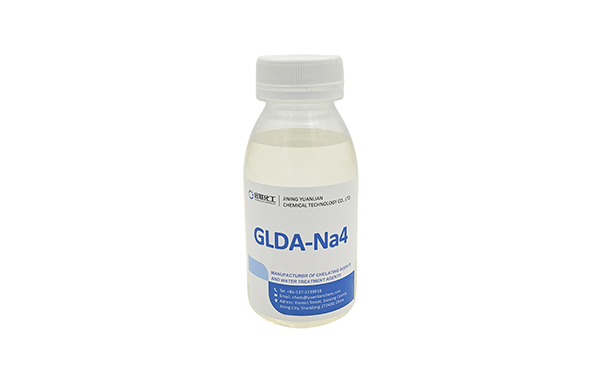Industrial resin regeneration faces significant sustainability challenges. Conventional methods using strong acids, alkalis, or EDTA present considerable environmental and operational limitations.
These traditional approaches often result in resin column clogging, leading to flow restrictions, channeling, extended elution peaks, and even resin fragmentation. More critically, EDTA demonstrates poor biodegradability, persisting in ecosystems and potentially releasing heavy metals, which creates secondary pollution incompatible with modern environmental standards.
GLDA: Green Chemistry Innovation
Tetrasodium Glutamate Diacetate (GLDA) represents a sustainable breakthrough. Derived from L-glutamic acid (produced through carbohydrate fermentation), this amino-acid-based chelator combines effectiveness with environmental responsibility.

Certified Environmental Credentials
GLDA achieves 90% biodegradation within 96 hours, breaking down completely into water and carbon dioxide. This exceptional biodegradability profile makes it ideal for environmentally-conscious resin regeneration processes.
The production process demonstrates a significant improvement in sustainability: carbon emissions are reduced to just 30% of EDTA's footprint, without generating phosphorus-containingDA with 99.2% purity and heavy metal content below 0.1 ppm, compliant with EU Ecolabel standards.
Superior Technical Performance
GLDA maintains exceptional chelation stability across a broad pH range (2-12), adapting to various resin regeneration environments. It effectively chelates calcium, magnesium, and iron ions under both acidic and alkaline conditions.
Comparative studies confirm GLDA's calcium and magnesium chelation capacity exceeds traditional EDTA and its salts, outperforming citrate and phosphate alternatives. This enables either reduced chemical usage or improved results at equivalent dosages.
Technical Advantages in Resin Regeneration
GLDA delivers multiple operational benefits for resin regeneration processes:
The solution effectively prevents resin column clogging. Unlike conventional methods where microbial contamination and resin fragmentation cause flow issues, GLDA's potent chelation and dispersion properties remove metal ions and prevent agglomeration.
Compared to nitric or hydrochloric acid descalers, GLDA demonstrates minimal corrosivity. Research indicates corrosion rates below 0.002 mm/year for 304 stainless steel and carbon steel, significantly extending equipment and resin service life.
The solution exhibits exceptional thermal stability, maintaining performance at temperatures up to 85°C. This heat resistance ensures reliable performance even in high-temperature regeneration systems.
Case Study: GLDA Implementation Success
A chemical plant adopting GLDA for ion-exchange resin regeneration achieved remarkable environmental and economic outcomes:
Previously using conventional acid regeneration quarterly, the process generated high-COD wastewater with substantial treatment costs.
After implementing GLDA regeneration:
-
Regeneration cycles extended from quarterly to annually
-
Resin ion-exchange capacity recovery reached 98.5% (versus 92% previously)
-
Wastewater COD reduced from 1200 mg/L to 300 mg/L
-
Annual sludge production decreased by 1200 tonnes
-
Wastewater treatment costs lowered by over 60%
Future Outlook: The Era of Green Regeneration
As environmental regulations become mandatory, technological innovation provides competitive advantage. GLDA's emergence represents both a chemical engineering breakthrough and a paradigm shift toward sustainable industrial practices.
With China's new detergent regulations and increasingly stringent EU REACH restrictions on phosphorus and nitrogen, GLDA emerges as the compliant solution of choice. Market projections indicate GLDA's penetration in China's industrial cleaning sector will rise from 18% to 35% by 2026, driving related industry chain output beyond €6 billion.
For enterprises involved in resin regeneration, water treatment, and chemical production, adopting GLDA represents not merely regulatory compliance, but a strategic commitment to enhanced competitiveness and sustainable development.
Choosing GLDA means selecting superior resin regeneration performance while contributing to reduced water pollution and ecological protection. Green chemistry is quietly transforming our industrial landscape – one regeneration cycle at a time.


Contact us